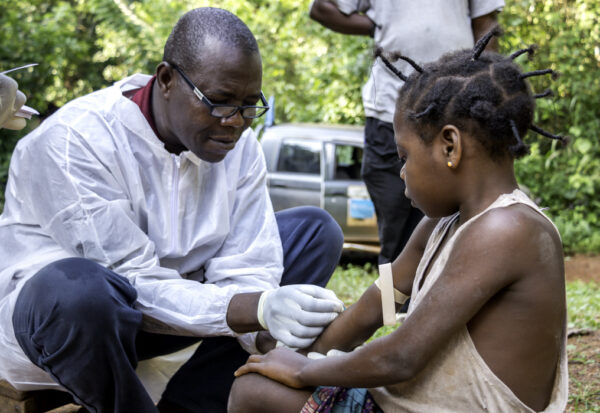Towards expanded sentinel surveillance of respiratory infections in Africa
Towards expanded sentinel surveillance of respiratory infections in Africa

© Institut Pasteur de Bangui/Jean-Marc Zokoué
Respiratory viruses are high-risk pathogens and require special attention in international health surveillance. Frontiers Public Health has published a scientific article on the workshop organized by the Centre Pasteur du Cameroun and the Institut Pasteur, held in Yaoundé in March 2023. The event brought together AFROSCREEN project epidemiologists from the Centre Pasteur du Cameroon, the Institut Pasteur in Bangui, Central African Republic, the Institut Pasteur in Dakar, Senegal, the Institut Pasteur in Madagascar and the Institut Pasteur in Paris. The aim was to come up with an innovative surveillance strategy.
The article“African countries from the Pasteur Network reexamine their syndromic sentinel surveillance system associated with household contact within the AFROSCREEN program” outlines epidemiologists’ deliberations on the definition of a pilot sentinel surveillance program for severe acute respiratory infections (SARI) and the detection of new pathogens, known as “Pathogen X”, capitalizing on experience gained during the Covid-19 pandemic in Africa.
How can we optimize SARI surveillance and the detection of new pathogens in Africa? The approach put forward is to combine syndromic sentinel surveillance, including household contacts, with existing biological surveillance for influenza, drawing on the sequencing capabilities strengthened by the AFROSCREEN project.
Lessons learned from the Covid-19 pandemic have highlighted the importance of these approaches for anticipating and controlling the spread of emerging health threats. The integration of sequencing capabilities for early detection of high-risk SARS-CoV-2 variants and other emerging pathogens was also highlighted. To complement this approach, the use of real-time surveillance systems, such as the Réseau 4S in Senegal, was proposed to enable early detection of epidemics of febrile syndromes and respiratory infections.
The pilot phase of the extended surveillance program, led by Pasteur Network epidemiologists in collaboration with other AFROSCREEN project partners, will focus on strengthening SARI surveillance and diagnosis, assessing the impact of SARS-CoV-2 on SARI epidemiology, and integrating Pathogen X detection thanks to advances in sequencing and epidemiological criteria derived from holistic approaches.
Link to article: https://pubmed.ncbi.nlm.nih.gov/38249384/
© Institut Pasteur de Bangui/Jean-Marc Zokoué
Respiratory viruses are high-risk pathogens and require special attention in international health surveillance. Frontiers Public Health has published a scientific article on the workshop organized by the Centre Pasteur du Cameroun and the Institut Pasteur, held in Yaoundé in March 2023. The event brought together AFROSCREEN project epidemiologists from the Centre Pasteur du Cameroon, the Institut Pasteur in Bangui, Central African Republic, the Institut Pasteur in Dakar, Senegal, the Institut Pasteur in Madagascar and the Institut Pasteur in Paris. The aim was to come up with an innovative surveillance strategy.
The article“African countries from the Pasteur Network reexamine their syndromic sentinel surveillance system associated with household contact within the AFROSCREEN program” outlines epidemiologists’ deliberations on the definition of a pilot sentinel surveillance program for severe acute respiratory infections (SARI) and the detection of new pathogens, known as “Pathogen X”, capitalizing on experience gained during the Covid-19 pandemic in Africa.
How can we optimize SARI surveillance and the detection of new pathogens in Africa? The approach put forward is to combine syndromic sentinel surveillance, including household contacts, with existing biological surveillance for influenza, drawing on the sequencing capabilities strengthened by the AFROSCREEN project.
Lessons learned from the Covid-19 pandemic have highlighted the importance of these approaches for anticipating and controlling the spread of emerging health threats. The integration of sequencing capabilities for early detection of high-risk SARS-CoV-2 variants and other emerging pathogens was also highlighted. To complement this approach, the use of real-time surveillance systems, such as the Réseau 4S in Senegal, was proposed to enable early detection of epidemics of febrile syndromes and respiratory infections.
The pilot phase of the extended surveillance program, led by Pasteur Network epidemiologists in collaboration with other AFROSCREEN project partners, will focus on strengthening SARI surveillance and diagnosis, assessing the impact of SARS-CoV-2 on SARI epidemiology, and integrating Pathogen X detection thanks to advances in sequencing and epidemiological criteria derived from holistic approaches.
Link to article: https://pubmed.ncbi.nlm.nih.gov/38249384/